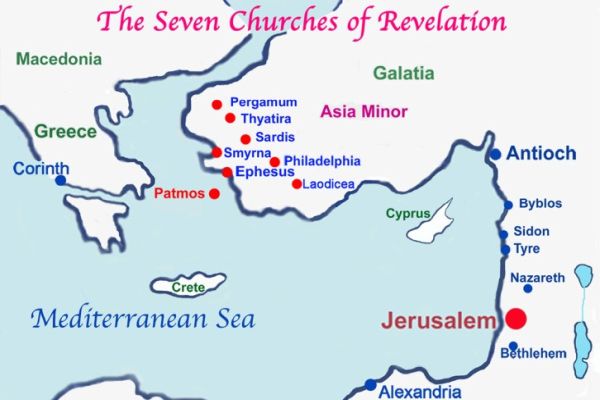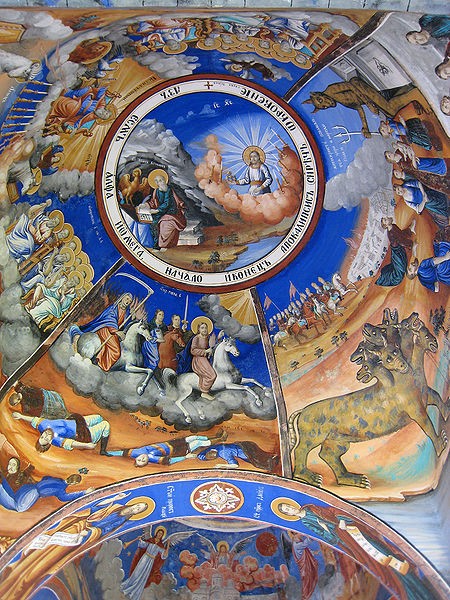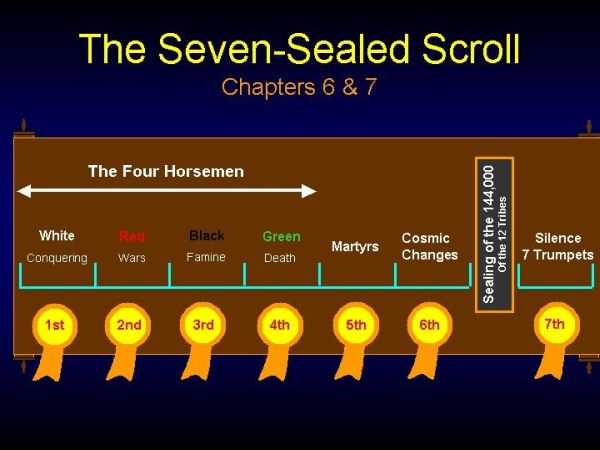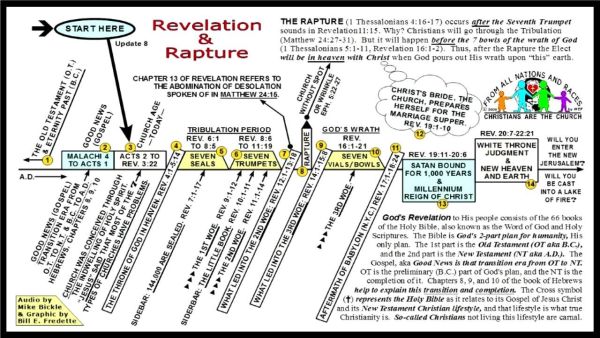Session 27 - Revelation
Author
Believed by many to be the Apostle John (though there is no direct evidence), or a "John", who had been exiled to the island of Patmos by the Roman authorities for preaching the gospel in Asia (modern-day Turkey). Some traditions say that John was dropped into a vat of boiling oil, but when he did not die, he was instead banished to the barren rock of Patmos, where slaves were sometimes sent to work in salt mines.

Patmos, an isolated Roman penal settlement
Date of Composition
96AD is commonly accepted. By now, Christianity had been established for decades; the first generation were nearly all gone, many as martyrs. Persecution continued.
Purpose and Audience
"This is a revelation from (of) Jesus Christ, which God gave him to show his servants the events that must soon take place. He sent an angel to present this revelation to his servant John, who faithfully reported everything he saw. This is his report of the word of God and the testimony of Jesus Christ" (1:1, 2).
The title of the book, Revelation (not "Revelations" or "Revelation of St John"), comes from the Greek word "apocalypse" and refers to an unveiling or a disclosure of something as yet unknown, like opening a curtain. This title is certainly appropriate for the book.
People are interested in the future. (Secular magazines contain horoscopes and ads by clairvoyants, tarot card readers, etc.) ¼ of the Bible is prophecy, much of it still in the future (for the writers). "Eschatology" is theology's attempt to put a complex jigsaw together. We need to begin reading Revelation as it was understood by the original hearers.
Revelation is the only book in the Bible that contains the promise that "God blesses the one who reads the words of this prophecy to the church, and he blesses all who listen to its message and obey what it says, for the time is near" (1:3, 22:7), and will judge those who tamper with it (22:18, 19). Read it ... and think about what it says.
Structure
The Revelation of Jesus Christ is full of descriptions of the last days before Christ's return and the ushering in of the new heaven and new earth. It begins with letters to seven churches in Asia Minor, then goes on to reveal a series of devastations on the earth; the mark of the beast, "666"; the battle of Armageddon; binding of Satan; reign of the Lord; Great White Throne Judgment; and the eternal city of God.
John addressed his work to seven Asian churches - Ephesus, Smyrna, Pergamum, Thyatira, Sardis, Philadelphia, and Laodicea (see map). Because (according to tradition) he worked as a Christian leader in Ephesus for many of his later years, it would have been natural for him to communicate this vision to the churches under his immediate care and/or influence. Each church received a message directed specifically to them (chapters 2 and 3). The book then launches into an account of the future.
The first recipients would have read Revelation in the context of a polytheistic world and a powerful Roman Empire that was opposed to Christianity. Before rushing to interpret what the signs, symbols and prophetic passages mean, read it through their eyes.
Rev 4-18 provides the clearest biblical portrait of the events of the "tribulation". The tribulation is seen differently by different schools. For those who hold to a "pre-tribulation" interpretation, it will be a time of judgment, when those left on earth after the rapture (1 Thes 4:13-18) will suffer deeply for their nonbelief. John pictured this judgment as a series of twenty-one events—inaugurated by the breaking of seven seals, the blowing of seven trumpets, and the pouring out of seven bowls. This judgment on the sinfulness of humanity shows the seriousness with which God views sin.
In the first chapter, the risen and exalted Christ is speaking to John. Christ tells John to "write, therefore, what you have seen, what is now and what will take place later." The things John had already seen are recorded in chapter 1. The "things which are" (that were present in John's day) are recorded in chapters 2-3 (the letters to the churches). The "things that will take place" (future things) are recorded in chapters 4-22.
Chapter 19 describes Christ's return with the church, the bride of Christ. He defeats the beast and the false prophet and casts them into the lake of fire. In Chapter 20, Christ has Satan bound and cast in the Abyss. Then Christ sets up His kingdom on earth that will last 1000 years. At the end of the 1000 years, Satan is released and leads a rebellion against God. He is quickly defeated and cast into the lake of fire. Then the final judgment occurs, the judgment for all unbelievers, when they too are cast into the lake of fire.
Chapters 21 and 22 describe what eternity with Him will be like.

Revelation has been the subject of great debate (and fear/elitism leading to creation of cults) over centuries. It has been "interpreted" more than any other book in the Bible.
There are four common theological approaches to Revelation:
- Futurist approach - sees Revelation (after the letters to the churches) referring to events that have not come to pass, but will occur at the end of the age.
⟹ This is the usual evangelical position
- Preterist approach - looks back to the events of the first century, such as the struggle of Christianity in the face of the persecutions by the Roman Empire, the fall of Jerusalem in 70 AD, and the desecration of the temple that year.
- Historicist approach - sees in Revelation a broad view of history; passages in Revelation are identified with historical people and events.
- Idealist (or Spiritualist, or Symbolic) approach - the events of Revelation are purely symbolic, depicting the struggle, and ultimate triumph, of good over evil.
Internally, Revelation contains some important clues. It is:
- revelational - God wants us to read and understand it
- Christological - the "revelation of Jesus Christ" is the key
- heavily symbolical - signs, symbols, types, figures, emblems and metaphors, as well as literal events - only some are explained in the context; the meanings of some are withheld
- eschatological - written to show "things to come"
- chronological - past, present and future culmination of the program of God
- prophetic - "what must soon take place"
What is the Millennium?
A thousand-year reign by Jesus Christ. This element of eschatology has also been debated at length and there are several key views among theologians
| Premillennial | Christ will return physically and personally, to set up His Kingdom over the earth. Christians who have died will be raised, and will reign with Him for 1,000 years. After this, there will be a final rebellion. God will prevail and the wicked will be judged. |
| Postmillennial | The idea of 1,000 years is probably figurative; it speaks of a long period of time before the coming of Christ. The triumph of the Gospel will usher in a period of peace that will endure until Christ returns. |
| Amillennial | The millennium is non-existent as a literal period; it represents the intermediate state of the dead. Christ may return at any time, judge the world and usher in new heavens and a new earth. |
The Seven Churches
The seven churches described in chapters 2 and 3 are seven literal churches that existed at the time John wrote. There is also spiritual significance for churches and believers today.
A possible third purpose that some have suggested is to use the seven churches to foreshadow seven different periods in Church history. However, each of the seven churches describes issues that could fit in any time in Church history. While there may be some truth to the seven churches representing seven eras, it is highly speculative. Our focus should be on what message God is giving us through the seven churches.
The seven churches are:
- Ephesus (2:1-7) - the church that had forsaken its first love (2:4)
- Smyrna (2:8-11) - the church that would suffer persecution (2:10)
- Pergamum (2:12-17) - the church that needed to repent (2:16)
- Thyatira (2:18-29) - the church that had a false prophetess (2:20)
- Sardis (3:1-6) - the church that had fallen asleep (3:2)
- Philadelphia (3:7-13) - the church that had endured patiently (3:10)
- Laodicea (3:14-22) - the church with lukewarm faith (3:16)

Location of Patmos and the 7 churches
We need to "hear" what the Holy Spirit says to these churches.
Who were the Nicolaitans? This sect (reflecting the example of Balaam in the OT) disobeyed the command to the Gentile churches that they should refrain from eating "things sacrificed to idols" (Acts 15:29). Such a restriction was prevented Christian communities from joining in some public festivals, and brought upon them suspicion and dislike; it, was necessary to prevent a return to a pagan laxity of morals. Paul warns against the same practices.
Key Issues
Jesus Christ
"' I am the Alpha and the Omega - the beginning and the end,' says the Lord God. 'I am the one who is, who always was, and who is still to come - the Almighty One' ".
The focus of chapter 1 is Jesus Christ, in His power and glory.
Usually when people mention Revelation, they think about signs, symbols, angels, thrones, elders, 144,000, plagues, apocalyptic horsemen, witnesses, a woman and a dragon, seals, trumpets, powerful leaders, terrors, battles, bowls, judgment and the Wedding Feast of the Lamb. They are all in there, go, read them, but they are not the main themes. Jesus Christ is. Any prophecy that does not place Him at the centre is not Biblical.

Revelation contains lots of graphic descriptions for church art.
The book of Revelation does not end with judgment. It is more than judgment, Revelation is a book about hope for those who are redeemed and faithful to Christ; they come from every tongue and every nation. The end of the book shows us a triumphant Saviour, a new heaven and a new earth (chapter 21).
Worship
"You are worthy, O Lord our God, to receive glory and honor and power. For you created all things, and they exist because you created what you pleased" (4:11).
"And then I heard every creature in heaven and on earth and under the earth and in the sea. They sang: 'Blessing and honour and glory and power belong to the one sitting on the throne and to the Lamb forever and ever.' " (5:13).
"They sang, 'Amen! Blessing and glory and wisdom and thanksgiving and honour and power and strength belong to our God forever and ever! Amen.' " (7:12)
"The book of Revelation is first a foremost a book of worship. John experienced his revelation while he was 'in the Spirit on the Lord's Day' (Rev. 1:10). After writing this powerful apocalyptic letter he sent it to be read in worship throughout the churches in Asia." (Eugene Peterson, Reversed Thunder).
Worship is an ongoing experience. The heavens and the believers on earth break out into song repeatedly in this book, including over the judgments of God.
The Church
Revelation confirms earlier Christian teaching about our hope:
- we have eternal life & hope for the future (cf Jn 3:36; 11:25, 26; 1 Jn 5:11, 12)
- "hope of certain resurrection" - Jn 5:29; 1 Tim 4:8; 1 Thes 4:14-17
- Christ is our life - Col 3:4
- His resurrection gives us "living hope and an inheritance that can never perish, spoil or fade, kept in heaven for us" (1 Pt 1:3-4)
- death can never separate us from His love - Rom 8:38
The book of Revelation consistently presents a picture of a victorious church. Even in the midst of great opposition and martyrdom, the church is seen as completely loyal to Jesus, operating in power, interceding for God's purposes, and worshipping at His judgments.
The Bible teaches us about judgement - Mt 16:27; Ac 17:31; 24:25; Rom 2:16; Heb 9:27, but offers the way out through Christ's substitutionary death.
Revelation reminds us that there is hope beyond the trials and struggles of this life. One day the darkness will pass, and we will all dwell in eternal light with Christ.
Recognizing these main themes helps us understand what Revelation is communicating to us.
Antichrist
There has been much (unhelpful/silly) speculation about the identity of the Antichrist for many centuries. The Bible does not say anything specific about where the Antichrist will come from. Some Bible scholars speculate that he will come from a confederacy of ten nations and/or a reborn Roman empire (Dan 7:24-25; Rev 17:7). Others see him as having to be a Jew in order to claim to be the Messiah. It is all speculation since the Bible does not specifically say where the Antichrist will come from or what race he will be. One day, the Antichrist will be revealed. 2 Thes 2:3, 4 tells us how we will recognize the Antichrist: "For that day will not come until there is a great rebellion against God and the man of lawlessness is revealed - the one who brings destruction. He will exalt himself and defy everything that people call god and every object of worship. He will even sit in the temple of God, claiming that he himself is God."
It is likely that most people alive when the Antichrist is revealed will be surprised at his identity. Martin Luther was convinced that the pope in his time was the Antichrist. During the 1940s, many believed Hitler was the Antichrist. Others who have lived in the past few hundred years have been equally sure as to the identity of the Antichrist. There continue to be candidates. So far, they have all been incorrect. Rev 13:5-8 declares, "The beast was given a mouth to utter proud words and blasphemies and to exercise his authority for forty-two months. He opened his mouth to blaspheme God, and to slander his name and his dwelling place and those who live in heaven. He was given power to make war against the saints and to conquer them. And he was given authority over every tribe, people, language and nation. All inhabitants of the earth will worship the beast—all whose names have not been written in the book of life belonging to the Lamb that was slain from the creation of the world." The Antichrist may, or may not, be alive today. Time will tell.

Neatly packaged for some, but "HiStory" is not so schematic.
We should be aware of what Revelation says, but put aside dogmatic speculation about the identity of the antichrist, 666, electronic chips, what the trumpets and seals are and focus on what the Bible says.
Cults/individuals have long predicted the date of Jesus' return, often with publicity and embarrassing results. Jesus said that only God know the time of His return - Mt 24:36-42; Mk 13:21, 22. It will be sudden - 1 Cor 15:52; Mt 24:27; and completely unexpected - 2 Pet 3:4, 10, 11; Mt 24:48-51; Rev 16:15; Mark 13:23.
Passages in the Bible speak of a time of terrible tribulation; in connection with the rise of an "Antichrist".
Christians are not in agreement as to exactly what this means in historical terms and when it will occur. Many evangelical Christians hold to one of three positions:
| Pre-Tribulation Rapture | God has not appointed Christians to wrath - 1 Thes 5:9. The church and the Holy Spirit will leave the earth before the rise of the Antichrist. |
| Mid-Tribulation Rapture | The church will remain on the earth till the Antichrist breaks his covenant with Israel and will be raptured at the 3 ½ year mark in a 7 year period. |
| Post-Tribulation Rapture | The church will go through the entire y-year period of the Antichrist's reign. They will either be supernaturally safeguarded or greatly suffer. |
Other Christians do not believe a Tribulation will occur in this way.

Bucharest (AD). Prophecy junkies are typically wrong.
For Reflection:
- John's image of Jesus was one of power and majesty. Although a prisoner for preaching Christ, the image was enough to dispel all fear. What is your image of Him?
- take a week to read the letters to the 7 churches, ie one a day. Reflect on the words say and what you can take away in terms of your own life as a Christian.
- for many who follow prophecy conferences Revelation is a "futuristic cosmic view of history", to be worked out and assigned to nations, leaders, social movements and dates - that approach (most of which turns out to be speculative) is missing much of the message; Revelation is also about a God who reigns and knows His people; believers who know that He has everything in control and therefore have hope for the future, and for eternal life;
- what does all this mean for Christians? we are called to:
- read the book, along with other parts of the Bible
- "hear" what the Holy Spirit is saying to the churches/Christians today
- purify ourselves - 1 Jn 3:2, 3
- do the work of Christ with fully committed hearts - 2 Tim 4:1; looking forward to the Lord's "well done, good and faithful servant" (Mt 25:21)
- have our hearts set on His coming - 2 Tim 4:8; Heb 10:28
- take heart because God is in control - Jn 14:1
- have confidence in the fulfillment of God's purpose in our lives - Phil 1:6
- be faithful to God and His Word - 1 Tim 6:13, 14
- be on guard - Mk 13:35-37
- the earliest Christians often greeted one another with "Maranatha", or "The Lord is Coming". We need to keep this message and hope before us.

There are usually lots of interpretations:

Got it all worked out? Some right... some wrong ...
"The views expressed in this diagram do not necessarily represent the views of this station."
- "Even so, come Lord Jesus" (Revelation 22:20)







